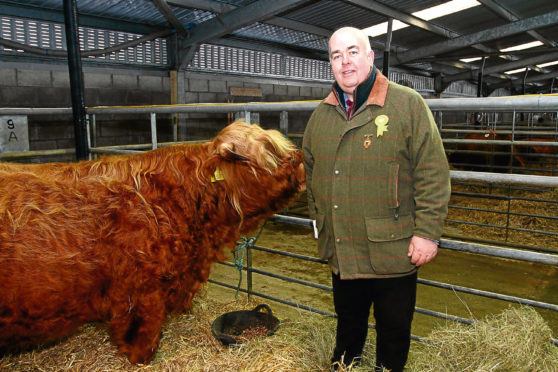Relying on the picture postcard image of Highland cattle to promote the breed will no longer be enough to secure its future, the new president of the Highland Cattle Society has admitted.
Aberdeenshire farmer Gordon McConachie was elected to the role at the weekend and yesterday acknowledged that Highlanders hadn’t kept pace with other breeds.
He said his aim as president was to turn that situation around by putting his weight behind a promotional drive aimed at commercial beef producers.
Speaking at the breed’s bull show at Oban, Mr McConachie said the pedigree wing was doing well but commercial farmers were failing to see the potential of Highlanders.
“A lot of people think of them as hobby cattle which don’t make money, and in a lot of markets Highland steers make less per kilo than dairy bulls. We have to get away from that stigma,” he said.
“The end product is great and in demand. It’s doing well in Sainsburys and Waitrose, so the finishing job is good but we now need middle men to see there’s money in them. We will promote how low-cost and effective they are and we will be going down the line of providing a scientific background to prove what we’re saying.”
Mr McConachie said it would be a while before the breed reached the stage of recording EBVs and back fat, but breeders were already starting to record calf weights.
He said: “We need to move away from the picture postcard image and demonstrate the commercial potential of this breed.”
Gordon McConachie farms at Cuilgrianan near Insch and has kept Highlanders for 27 years. He accepted the criticism that the breed took a notoriously long time to finish.
“Yes, they’re naturally slower to finish than other breeds and they don’t respond to concentrates until they’re two years old. But they cost no more to produce than other beef,” he said.
“These are low-cost cattle which winter outdoors and are great at converting poor-quality forage into great beef.”
He also admitted that the breed’s traditional horns can pose a problem for farmers and slaughterhouses which charge more to kill Highlanders, but he said there was no reason why commercial stock shouldn’t be dehorned.
At the breed’s next big show and sale at Oban in October there will be new classes for unregistered, dehorned and cross Highland cattle.
“The horned image will remain as a focal point for the traditional pedigree breed but we need to ensure it survives in the long term, and that means making changes,” he said.
“If we can promote the commercial side the pedigree market will look after itself.”
